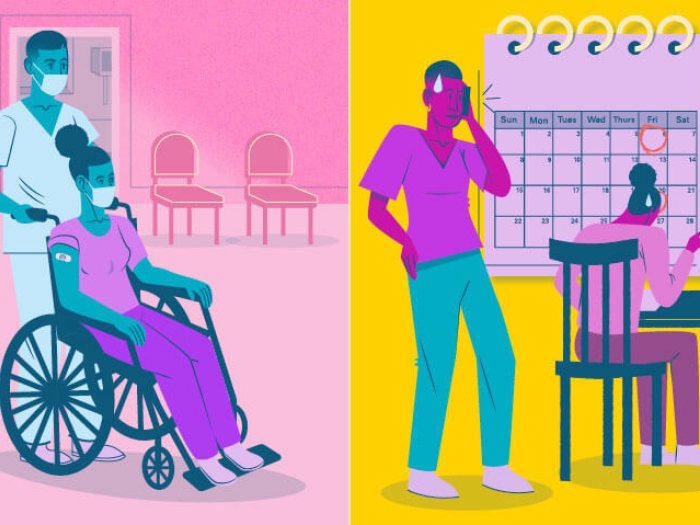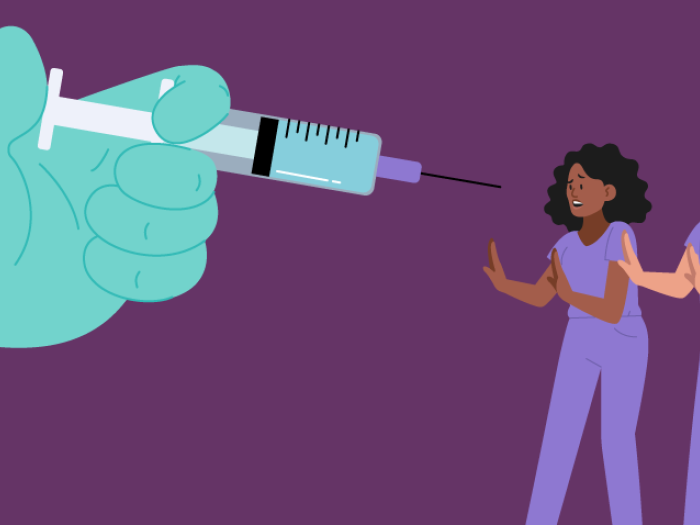A physician reflects on the loss of a U-M alumnus to COVID-19—and what her experience can teach us.
5:20 PM
Author |

Susan Moore, M.D., was a well-regarded 2002 graduate of the U-M Medical School who died last month after battling COVID-19. Concerns about her care at an Indiana hospital have spurred a national discussion on racial inequities in health care. Moore was a member of the extended Michigan Medicine family. Our faculty, staff and her classmates mourn her loss and extend our condolences to her family and friends.
Like many in the medical community, I first learned of Dr. Susan Moore's story on Twitter.
"It is so hard to watch this video from our @umich medical school classmate. Rest in Peace, Dr. Susan Moore," a colleague tweeted. I clicked and the video filled my screen: A Black woman, speaking directly into the camera—nasal cannula in place, hospital gown on—recounted how her medical team had dismissed her symptoms and pain again and again as she advocated for proper treatment.
Dr. Moore died of COVID-19 on Dec. 20.
Though I already knew the outcome of her illness, I watched the video again and again. Tears sprung to my eyes as I saw an ill patient crying out for help. Knowing that she was a physician, a fellow alumnus of the University of Michigan Medical School, made her experience even more personal. If she couldn't advocate and protect herself in the healthcare system, then who could?
I immediately texted my colleague, asking, "What is it going to take to get equitable care in America?" In the weeks since I sent that text, I have continued to ask myself that question.
*****
Months before Dr. Moore's video, COVID-19 had already laid bare the vast health disparities that exist, especially within our home state of Michigan. Early in the pandemic, Black people, who make up approximately 13% of residents, accounted for over 40% of deaths. Though this gap has narrowed some, the Black community has continued to carry an undue burden of COVID-19 diagnosis and death.
LISTEN UP: Add the new Michigan Medicine News Break to your Alexa-enabled device, or subscribe to our daily updates on iTunes, Google Play and Stitcher.
Watching the video of Dr. Susan Moore, and subsequently learning the entire story of her struggles in a medical system to which she had dedicated her professional life, brought into relief the systemic racism that underpins the inequities within our healthcare systems.
By acknowledging the processes, procedures, and policies that promote and maintain these inequities, we can begin to strive toward our ideal—an inclusive and equitable organization that is focused on the well-being of its patients and employees alike. This can be part of Dr. Moore's legacy—that in her unjust death, she spurs positive change at healthcare institutions around the country.
Michigan Medicine has taken important steps in the past year, including standing up the Antiracism Oversight Committee (AROC), as well as continued engagement with the university-wide strategic plan focused on diversity. As an organization, we must continue this work for the well-being of our patients, as well as our faculty, staff and learners.
But what can we do as individuals to combat racism and inequity in medicine? I propose three interventions we can commit to daily that can start the process of meaningful change.
Speak Up: I find speaking up when one sees injustice or inequities incredibly daunting. It's much easier for me to speak up about macroaggressions—the death of George Floyd, the profiling of Christian Cooper in Central Park, the mistreatment of Dr. Moore.
However, I have found that microaggressions—like a racially-tinged joke or questioning where someone is "really from"—play an outsize role in derailing progress. Whether it's your supervisor, a colleague, or a patient, gently but firmly correcting misstatements and misbeliefs can elevate the entire organization. It is also a sign of solidarity and ally-ship with those who have regularly experienced such actions.
Reach Out: Every person you interact with has a distinctive life story, experiences, and perceptions. By getting to know those around us on a deeper level, we build community that is focused on celebrating our unique contributions. In doing so, we can eliminate a "them versus us" mentality, and create a cohesive "we." Building a safe arena in which individuals can share their personal stories takes considerable work. I am always impressed by the depth and breadth of those around me, and appreciate the many forms of diversity from which I can learn.
Look Within: Arguably the hardest, this step can be the most powerful. Despite my commitment to forming diverse teams, promoting inclusive community, and providing equitable care, at times I have found myself falling short. I, like most people, have found myself in situations in which I have made an insensitive comment, shirked the opportunity to call out bias, or failed to acknowledge and respect differing opinions. However, those moments, though difficult, have taught me important lessons and inspired me to improve. They have also taught me grace—despite our best intentions, we will at times make mistakes. It is our response to those mistakes that defines us, not the slight misstep made.
MORE FROM MICHIGAN: Sign up for our weekly newsletter
The death of Dr. Moore is a tragedy in what was a tragic year. However, we have an opportunity to honor and respect her legacy. Just as she advocated bravely for her patients, her community, and herself, we too can take up the mantle against injustice. I am inspired by her strength—desperately ill, yet she mustered the ability to call out systemic racism. "I put forth and maintain that if I was white…I wouldn't have to go through that" were some of her poignant final words in her recording. I agree, Dr. Moore—may we work toward a world in which those words are no longer true.
About the author: Dr. Matthew Wixson, a 2012 University of Michigan Medical school graduate, is currently a clinical assistant professor of anesthesiology. He also serves as the Associate Chair for Diversity in the Department of Anesthesiology

Explore a variety of health care news & stories by visiting the Health Lab home page for more articles.

Department of Communication at Michigan Medicine
Want top health & research news weekly? Sign up for Health Lab’s newsletters today!





